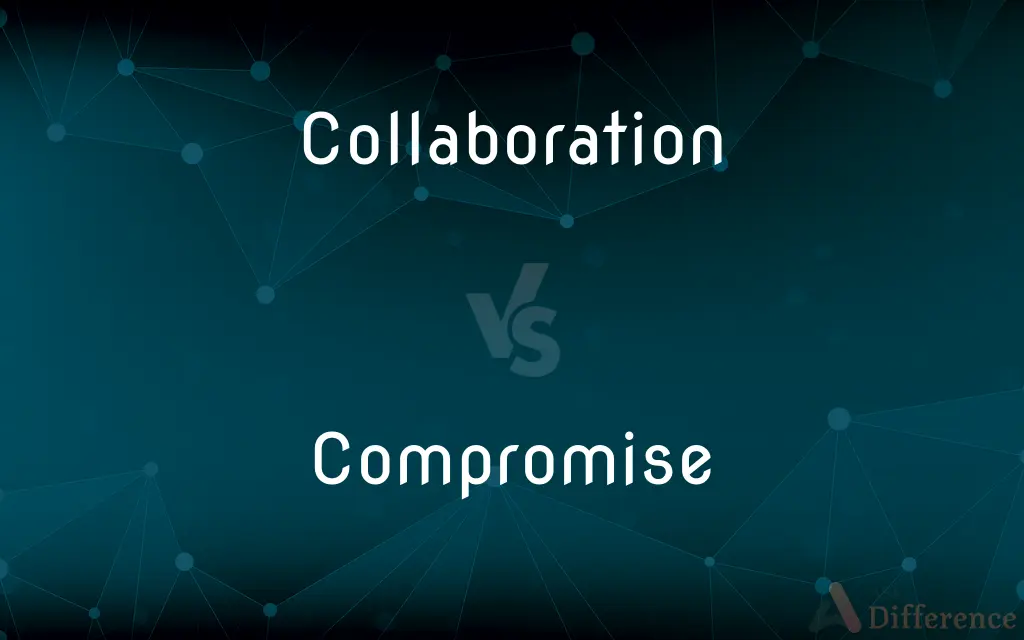Collaboration vs. Compromise — What's the Difference?
Edited by Tayyaba Rehman — By Maham Liaqat — Updated on March 19, 2024
Collaboration involves joint efforts towards a common goal, enhancing outcomes, while compromise requires each party to concede some demands, balancing interests.

Difference Between Collaboration and Compromise
Table of Contents
ADVERTISEMENT
Key Differences
Collaboration is a cooperative process where individuals or groups work together, combining their strengths, resources, and ideas to achieve a shared objective. This approach often leads to innovative solutions and synergistic outcomes that might not be possible through individual efforts. In contrast, compromise involves each party giving up part of their demands or preferences to reach a mutually acceptable solution. While compromises can resolve conflicts and facilitate agreements, they may not always result in the most optimal or creative outcomes, as they rely on concessions rather than joint problem-solving.
In collaboration, the focus is on open communication, trust, and leveraging diverse perspectives to enhance the end result. It's about finding ways to achieve a goal that respects and incorporates everyone's contributions. On the other hand, compromise is more about negotiation and balancing interests, where the final outcome may not fully satisfy any party but is acceptable to all involved.
Collaboration is often seen in environments that value teamwork, innovation, and collective goal achievement, such as in project teams, research endeavors, and creative industries. Compromise is more common in situations where conflicting interests must be managed, such as in diplomacy, politics, and personal relationships.
The success of collaboration depends on the willingness of participants to share knowledge, skills, and effort towards a common goal, often leading to a sense of shared achievement. Compromise, while necessary in many contexts to move forward, can sometimes leave parties feeling like they've lost something, which may affect future interactions.
Both collaboration and compromise are essential interpersonal and organizational strategies, chosen based on the situation, desired outcomes, and the nature of the relationships between the parties involved.
ADVERTISEMENT
Comparison Chart
Definition
Joint effort towards a common goal, emphasizing teamwork and collective success
Each party makes concessions to reach a mutually acceptable solution
Focus
Leveraging strengths and ideas for enhanced outcomes
Balancing conflicting interests to find an acceptable middle ground
Outcome
Often leads to innovative and synergistic solutions
May result in solutions where no party is fully satisfied, but all can accept
Environment
Common in settings that value innovation, teamwork, and shared goals
Used in situations where conflicting interests need to be managed
Impact on Relationships
Tends to build trust and strengthen relationships through shared achievements
Can maintain relationships by resolving conflicts but may leave parties feeling they've lost something
Compare with Definitions
Collaboration
A process where individuals or groups work together towards a shared goal.
Scientists from different countries collaborating on a vaccine development.
Compromise
A situation where each party gives up something to reach an agreement.
Diplomatic negotiations where countries compromise on policy issues to achieve peace.
Collaboration
Involves pooling knowledge, resources, and efforts for better outcomes.
A cross-functional team collaborating to launch a new product.
Compromise
Aimed at resolving conflicts by finding a middle ground.
Business partners compromising on investment strategies to move forward.
Collaboration
Encourages creative solutions and innovation.
Artists collaborating on a mixed-media art project to explore new expressions.
Compromise
Often results in solutions that, while not ideal, are acceptable to all parties.
Compromise in legislative processes leading to laws that are agreeable to multiple parties.
Collaboration
Focuses on achieving a result that reflects collective input and effort.
Collaborative research leading to breakthroughs that reflect the team's diverse expertise.
Compromise
Necessary for maintaining relationships despite differing views.
Family members compromising on holiday plans to accommodate everyone.
Collaboration
Strengthens relationships and builds trust among participants.
Collaboration between departments leading to a more cohesive organizational culture.
Compromise
May involve sacrificing optimal outcomes for agreement.
Compromising on budget allocations to finalize a project plan.
Collaboration
Collaboration is the process of two or more people, entities or organizations working together to complete a task or achieve a goal. Collaboration is similar to cooperation.
Compromise
To compromise is to make a deal between different parties where each party gives up part of their demand. In arguments, compromise is a concept of finding agreement through communication, through a mutual acceptance of terms—often involving variations from an original goal or desires.
Collaboration
The action of working with someone to produce something
He wrote a book in collaboration with his son
Compromise
An agreement or settlement of a dispute that is reached by each side making concessions
Eventually they reached a compromise
The secret of a happy marriage is compromise
Collaboration
Traitorous cooperation with an enemy
He faces charges of collaboration
Compromise
Settle a dispute by mutual concession
In the end we compromised and deferred the issue
Collaboration
To work together, especially in a joint intellectual effort.
Compromise
Expediently accept standards that are lower than is desirable
We were not prepared to compromise on safety
Collaboration
To cooperate treasonably, as with an enemy occupation force in one's country.
Compromise
Bring into disrepute or danger by indiscreet, foolish, or reckless behaviour
Situations in which his troops could be compromised
Collaboration
(uncountable) The act of collaborating.
Collaboration can be a useful part of the creative process.
Compromise
A settlement of differences in which each side makes concessions.
Collaboration
(countable) A production or creation made by collaborating.
The husband-and-wife artists will release their new collaboration in June this year.
Compromise
The result of such a settlement.
Collaboration
(uncountable) Treasonous cooperation.
He has been charged with collaboration.
Compromise
Something that combines qualities or elements of different things
The incongruous design is a compromise between high tech and early American.
Collaboration
The act of working together; united labor.
Compromise
A weakening or reduction of one's principles or standards
A compromise of morality.
Collaboration
The act of willingly cooperating with an enemy, especially an enemy nation occupying one's own country.
Compromise
Impairment, as by disease or injury
Physiological compromise.
Collaboration
Act of working jointly;
They worked either in collaboration or independently
Compromise
To arrive at a settlement by making concessions.
Collaboration
Act of cooperating traitorously with an enemy that is occupying your country
Compromise
To reduce the quality, value, or degree of something, such as one's ideals.
Compromise
To expose or make liable to danger, suspicion, or disrepute
A secret mission that was compromised and had to be abandoned.
Compromise
To reduce in quality, value, or degree; weaken or lower
Don't compromise your standards.
Compromise
To impair, as by disease or injury
An immune system that was compromised by a virus.
Compromise
To settle by mutual concessions
A dispute that was compromised.
Compromise
The settlement of differences by arbitration or by consent reached by mutual concessions.
Compromise
A committal to something derogatory or objectionable; a prejudicial concession; a surrender.
A compromise of character or right
Compromise
(computer security) A breach of a computer or network's rules such that an unauthorized disclosure or loss of sensitive information may have occurred, or the unauthorized disclosure or loss itself.
Compromise
(ambitransitive) To bind by mutual agreement.
Compromise
To adjust and settle by mutual concessions; to compound.
Compromise
(intransitive) To find a way between extremes.
Compromise
To pledge by some act or declaration; to endanger the life, reputation, etc., of, by some act which can not be recalled; to expose to suspicion.
Compromise
(transitive) To cause impairment of.
Compromise
(transitive) To breach (a security system).
They tried to compromise the security in the computer by guessing the password.
Compromise
A mutual agreement to refer matters in dispute to the decision of arbitrators.
Compromise
A settlement by arbitration or by mutual consent reached by concession on both sides; a reciprocal abatement of extreme demands or rights, resulting in an agreement.
But basely yielded upon compromiseThat which his noble ancestors achieved with blows.
All government, indeed every human benefit and enjoyment, every virtue and every prudent act, is founded on compromise and barter.
An abhorrence of concession and compromise is a never failing characteristic of religious factions.
Compromise
To bind by mutual agreement; to agree.
Laban and himself were compromisedThat all the eanlings which were streaked and piedShould fall as Jacob's hire.
Compromise
To adjust and settle by mutual concessions; to compound.
The controversy may easily be compromised.
Compromise
To pledge by some act or declaration; to endanger the life, reputation, etc., of, by some act which can not be recalled; to expose to suspicion.
To pardon all who had been compromised in the late disturbances.
Compromise
To agree; to accord.
Compromise
To make concession for conciliation and peace.
Compromise
A middle way between two extremes
Compromise
An accommodation in which both sides make concessions;
The newly elected congressmen rejected a compromise because they considered it `business as usual'
Compromise
Make a compromise; arrive at a compromise;
Nobody will get everything he wants; we all must compromise
Compromise
Settle by concession
Compromise
Expose or make liable to danger, suspicion, or disrepute;
The nuclear secrets of the state were compromised by the spy
Common Curiosities
Does collaboration guarantee a successful outcome?
While collaboration can enhance outcomes through pooled resources and ideas, success also depends on effective communication, coordination, and commitment from all parties.
Can compromise be part of collaboration?
Yes, compromise can occur within a collaborative effort as parties negotiate roles, resources, and ideas to achieve the collective goal.
How can collaboration be encouraged in a competitive environment?
Fostering a culture that values collective success, recognizing collaborative achievements, and setting up systems that facilitate teamwork can encourage collaboration even in competitive settings.
Is collaboration always better than compromise?
Not necessarily; the choice between collaboration and compromise depends on the context, goals, and the nature of the relationship between parties.
Can a lack of trust affect the ability to compromise or collaborate?
Yes, trust is crucial for both strategies. A lack of trust can hinder open communication and willingness to share or concede, affecting the outcomes.
How do cultural differences impact collaboration and compromise?
Cultural norms and values can influence preferences for collaboration or compromise, communication styles, and the interpretation of actions and intentions.
Can compromise lead to resentment among parties?
It's possible, especially if parties feel they've consistently conceded more than others. Clear communication and fairness in the process can mitigate such feelings.
How do individual differences affect collaboration and compromise?
Individual differences in skills, experiences, and perspectives can enrich collaboration but may also necessitate compromise to harmonize diverse viewpoints.
Is collaboration more time-consuming than compromise?
Collaboration can be more time-consuming due to the need for coordination and consensus-building, but it can also lead to more sustainable and innovative solutions.
What role does leadership play in facilitating collaboration and compromise?
Effective leadership can create an environment that encourages open dialogue, fairness, and a focus on common goals, facilitating both collaboration and compromise.
Share Your Discovery

Previous Comparison
Construct vs. Theory
Next Comparison
Work vs. WorksAuthor Spotlight
Written by
Maham LiaqatEdited by
Tayyaba RehmanTayyaba Rehman is a distinguished writer, currently serving as a primary contributor to askdifference.com. As a researcher in semantics and etymology, Tayyaba's passion for the complexity of languages and their distinctions has found a perfect home on the platform. Tayyaba delves into the intricacies of language, distinguishing between commonly confused words and phrases, thereby providing clarity for readers worldwide.













































